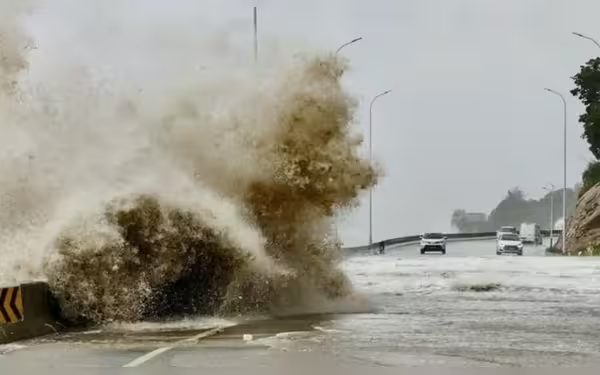Sunday, October 6, 2024 02:33 AM
Vietnam Faces $3.3 Billion Losses from Typhoon Yagi
- Typhoon Yagi causes $3.3 billion in economic losses.
- 299 fatalities reported in Vietnam due to the storm.
- UNICEF highlights six million children affected by Typhoon Yagi.
 Image Credits: brecorder
Image Credits: brecorderTyphoon Yagi devastates Vietnam with $3.3 billion in losses, claiming hundreds of lives and affecting millions.
Typhoon Yagi has wreaked havoc in Vietnam, leading to staggering economic losses estimated at $3.3 billion. This powerful storm, which struck earlier this month, primarily affected northern Vietnam, but its impact was felt across neighboring countries such as Laos, Thailand, and Myanmar. The typhoon has been described as one of the strongest to hit northern Vietnam in decades, bringing with it devastating winds and heavy rainfall.
According to state media reports, the aftermath of Typhoon Yagi has been catastrophic. In Vietnam alone, 299 people lost their lives, and 34 individuals are still reported missing. The situation is equally dire in Myanmar, where officials have confirmed 433 fatalities and 79 missing persons. The storm triggered severe floods and landslides, leading to a tragic loss of life and significant damage to infrastructure.
The economic toll of Typhoon Yagi is immense. The Vietnamese government has reported that over 390,000 houses were either damaged or flooded, and more than 345,000 hectares of crops were destroyed. Additionally, the storm resulted in the death of approximately 5.6 million head of poultry. This destruction not only affects the immediate livelihoods of those impacted but also poses a long-term threat to the agricultural sector, which is vital for the country’s economy.
Furthermore, the United Nations children’s agency, UNICEF, has reported that around six million children in the region have been affected by the storm. Access to essential services such as clean water, education, healthcare, food, and shelter has been severely compromised. This situation highlights the urgent need for humanitarian assistance and support for the affected communities.
Vietnam is no stranger to tropical storms, which typically occur between June and November each year. However, the increasing intensity of these storms can be attributed to human-driven climate change, which is making destructive weather patterns more likely. As the world grapples with the effects of climate change, it is crucial for countries like Vietnam to enhance their disaster preparedness and response strategies.
The devastation caused by Typhoon Yagi serves as a stark reminder of the vulnerabilities faced by nations prone to natural disasters. It is imperative for governments, organizations, and communities to come together to support recovery efforts and implement measures that can mitigate the impact of future storms. By learning from this disaster, Vietnam and its neighbors can work towards building a more resilient future, ensuring that they are better equipped to handle the challenges posed by climate change and extreme weather events.













